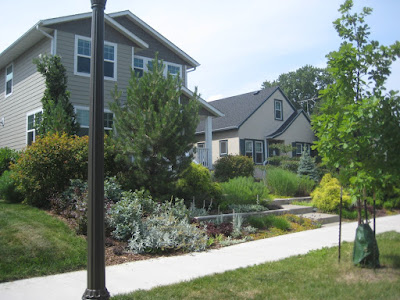I heard a new phrase recently that really caught my attention. A friend
was talking about some of her neighbors who don’t believe in spraying for
mosquito control, grow a lot of their food in their backyard, brew a little hooch
in their basement and use the sun for heating their homes (as much as
possible.) Urban homesteading is one label attached to these folks, ‘City
Hippies’ is another new moniker given to them.

The last time I heard about ‘city hippies’ was during a review of one
of my latest plays ‘By the Salton Sea.’ It was pointed out to me that rich
hippies were buying property around Joshua Tree National Park and converting
old cabins, homes and shacks into trendy upscale modern abodes for other rich
hippies from the coast.
It was almost a repeat of the migration of drug-fueled musicians,
artists, film makers and other creatives from the coast to the high desert.
Gram Parsons of Country Rock fame provided the signature moment when he
overdosed in a rundown motel up in Joshua Tree and thus the legend was born.
So,
what ever happened to those granola-crunching hippie chicks in their long
flowing dresses? The ones with a flower behind each ear and a naked baby
wrapped around their waist. Whatever happened to the back-to-the earth movement
and all those folks embracing mother nature? I think I found them and in a
place you’d hardly expect. The children and grandchildren of my generation have
moved back to the city.
Back
in October of 1967, that psychedelic generation, of my generation, disappeared
with the ‘Death of the Hippie’ ceremony in San Francisco. By then, time and
politics and media sat-uration had hastened the gradual demise of their tribe
as a cultural icon for peace and love and living the simple life.
Now
they’re back in plain sight and unabashed contentment. If you look carefully,
they’re all around us and it does make perfect sense after all. They’ve been
reborn in the children of those cultural pioneers of women’s rights, women’s sexual
freedom, political activism, social-involve-ment and community-caring.
But
these new hippies are no longer into paisley prints, flowery skirts and a
flower in their hair. They’re back living in the city instead of a commune in
the country. They’ve spearheaded the movement back to the city and found their
own community of like-mind souls in the rubble of those old vestiges of their
parent’s city. These women are smart, intuitive, vested in their community and
still carry subtle hints of the flower children of their mother’s era. Instead
of being college drop-outs, they’ve got advanced degrees and aren’t afraid to
show their gifts of intelligence and grounded observations of the world around
them.
They’re
reshaping their urban environment. Most urban areas have a sameness about them.
Urban populations are heterogeneous, consisting of various shades of
people-different castes, classes, ethnic groups, religions, etc. City hippies
have carved out their own unique group based on mutual interests in the environment,
education, conservation, sports, etc.
While
urban life can be dynamic, social relations there can be temporary. There seems
to be a high rate of geographical as well as social mobility which hippies
accept as the fluid condition of most neighborhoods. Chicken coops and
vegetable gardens are one sign of this new kind of urban dweller. But to really
understand their stance on the world, one has to look deeper inside their home.
It’s
the new woman of today who sees her children as precious uncut gems, her home
as her sanctuary and the community as her extended family. She can grow
vegetables in her backyard and still find great wine deals at Traders Joes. She
wants her kids in sports but says: “hold off on the trophies if it’s just for
showing up.” She values education above all else and places expectations on her
children’s teachers as she would on herself.
These
new hippies are raising kids and managing households without being encumbered
by the old axioms of the’ little woman at home.’ In many instances, they own
the real estate themselves or have negotiated the deal alongside their
husbands. They’ve come a long way,
baby…but don’t ever call them baby!
They’ve
traveled far beyond the homestead and have seen and done things only early
female pioneers could imagine. They’re as comfortable behind a podium as they
are on a glider nursing their infant.
They
see experience as food for the brain and the soul. It’s much the same for their
children. Summers are no longer for hanging around the playground or being
glued in front the boob tube. Now there are camps for every activity imaginable
and then some.
Back
in my day, hippies had the Oracle in
San Francisco and local mimeographed rag sheets to get the latest news of
community events. Most large cities had their own version of the Oracle. It was
probably the precursor to today’s ‘Reader’ rag sheets.
Now
in the Twin Cities, they’ve got internet message boards and news sites. If they
want to communicate in person from a distance, they can do Face time or use
other face-to-face mobile devices. Back in the day, there were communes to
raise the kids. Now these women have ECFE, Park and Rec. programs, play dates
and the old, reliable but newly energized resource on the horizon, their grandparents.
Community
gardens are still community gardens. But now there are direct farm-to-table
supply lines of fresh produce. Stimulants have changed from pot to fine wines
and craft beers.
And
of course, Whole Foods and Trader Joes, are available for organic fare. To save
money, they’ve got Savers and Good-Will and the old standard garage sales.
Many
of these women handle the household finances and know more about the globe
economy than a lot of the newly minted sprouts on Wall Street. They’re forging
new trails in women’s rights and equality. They’ve come a long way but they’ll
all tell you, there’s still a long way to go. Many seem to have taken a line
from the New Frugality in which ‘living within one’s means’ is the new norm
instead of the exception. And living a simpler, sustainable lifestyle is the
way to true wealth in mind and soul.
Maybe those hippies of my generation were on to something after all.






No comments:
Post a Comment